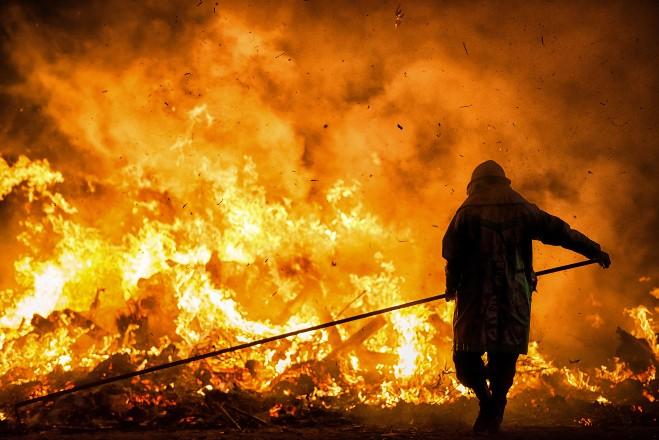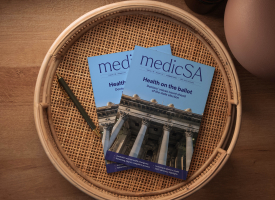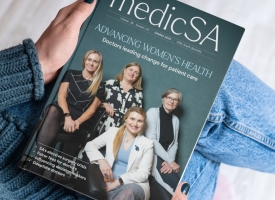Dr Omar Khorshid on open letter to the PM on climate change and COVID NSW opening plans
Transcript: Dr Omar Khorshid on ABC News Morning, with Joe O’Brien, Wednesday, 15 September 2021

Subject: Doctors sign open letter to the PM on climate change and COVID-19 in NSW
JOE O'BRIEN: An open letter to the Prime Minister, Scott Morrison, is calling on the Federal Government to urgently commit to tougher climate change targets. The letter was signed by the Australian Medical Association, Doctors for the Environment Australia, and 10 medical colleges and comes ahead of a Global Climate Summit in Glasgow. The letter warns extreme weather events such as flooding, fires and heatwaves pose both immediate and long-term health risks. Omar Khorshid is the President of the AMA and he joins us from Perth. Omar Khorshid, welcome. Why did you feel it was so important for the AMA to sign up to this which some people might think is a bit out of your remit?
OMAR KHORSHID: I think that's exactly the point, Joe. This climate emergency is a health emergency. There are health impacts of climate change right now being experienced around the world including here in Australia, and that's only going to get worse as we see the increase in global temperatures that is now inevitable. The science is in, there is no debate about whether our planet is warming. It's a matter of how much it's going to warm and the medical profession, that's all the specialists, medical colleges, the AMA and Doctors for the Environment, are calling on the Prime Minister for Australia to take a leading role, to commit to limiting the increase in global temperatures to 1.5 degrees and to start the action that's going to be needed to achieve that goal right now.
JOE O'BRIEN: And what about the 2030 goal?
OMAR KHORSHID: We’d really like to see actions starting now. And that means this decade. If we want to make any changes by 2030, we have actually got to start those processes immediately. So some of the things we're calling for, is for the health sector to recognise its own contribution to climate change, to emissions, and for us to start with our own backyard, to reduce our own emissions substantially down by about 80 per cent by 2030 and to net zero by 2040. So we want to take a leading role, but we need help from government. We need a sustainability unit that actually tells the health sector what they can do in concrete ways to make a change and for that leadership to be coming from our national government to assist our states and to assist all our private operators to do the right thing.
JOE O'BRIEN: Where do you think Australia's credibility on this stands heading into Glasgow now?
OMAR KHORSHID: We're not starting from a great position. As we all know, it's been an extremely difficult debate here in Australia and as an economy that relies very much traditionally on carbon-emitting industries, we're starting from a difficult position. But I think there is a recognition in the community now that this is real, it's happening and Australia must do its bit for us to have any chance of our children having a world to live in that is similar to the world we have now.
Let's be really frank here: if the worst-case scenario has happened, if global emissions don't start to decrease, we're looking at a world that looks very, very different to the world we're currently living in. Not just the health impacts but also economic devastation, countries disappearing, coastlines changing forever, severe weather events that will impact on our children's lives and this is all avoidable or at least reducible by action now.
JOE O'BRIEN: And what do you say to Australian politicians who might point to China and say, well, China still relies so heavily on coal and what's it doing, and we're only 1 per cent of global emissions?
OMAR KHORSHID: We are 1 per cent, but if every 1 per cent does its bit around the world, we will see the change that we need. What we'd like to see is Australia taking a leading position, like we have on so many other issues of global significance in our history. Rather than being the laggard, let's be one of the leaders and really fundamentally change our approach in the country and if we do so, we will develop new economic opportunities for Australians. This is not economy versus climate or economy versus health. I think COVID-19 has shown us that if we follow the science, if we take the steps that need to be taken, our economy benefits and the same message applies to climate change.
JOE O'BRIEN: And Omar, just while we have got you, I would like to ask you a few COVID questions as well. New South Wales is still likely to be the first state or territory today to reach that 80 per cent vaccination mark. After all these months of pretty tough news, how do you feel about getting to this pretty optimistic point today?
OMAR KHORSHID: It's certainly a milestone and it shows that despite all the very difficult public commentary, Australians are not anti-vaccination. Once they have access to vaccines they will go and get them because they see that their health is of critical importance and vaccination really is the only way for a healthy future for Australia.
We got a long way to go though, and the thing that we're probably most concerned about is whether meeting these targets leads to unrealistic opening up and that could have a devastating impact on our health system if we're not ready for the surge in cases that will happen even at 80 per cent double vax rate.
JOE O'BRIEN: What do you make of the plan as outlined so far by New South Wales in terms of opening up once milestones are reached?
OMAR KHORSHID: The plan to open up is actually very reasonable, to have a plan. Our concern is the timing of that opening up which could coincide with the peak in hospitalisations in New South Wales, and just further devastate the health sector. Even when you have got 70 per cent double vaxxed or heading towards 80 per cent double vaxxed, clearly you'll have less transmission occurring in the community, but once you withdraw the lockdowns and open the society up, we can expect cases to surge and if the vulnerable people are vaccinated, we may not see a huge additional impact on hospitals, but if hospitals are already bursting at the seams, already with hundreds and hundreds of people in ICU in mid-October, any additional demand on hospitals could actually lead to measurable health outcomes on people presenting to hospital with any condition, not just COVID. You probably don't want to have a heart attack or be diagnosed with cancer in October in New South Wales, and really we need to do everything we can to avoid our hospitals suffering from opening up too early.
JOE O'BRIEN: And from what you can tell, do the leaders, the political leaders, seem to be taking that into account with what they're saying at the moment?
OMAR KHORSHID: We are concerned that due to the fatigue in the community, due to the extraordinary pressure from business groups to open up, that New South Wales could be being a little optimistic and isn't fully taking into account its hospital system. We actually asked last week for the Government to release the modelling of the impact on hospitals of opening up at that time and what the cases will do. Because we have seen modelling of this current outbreak in New South Wales without withdrawing the lockdowns. We have seen, of course, the Doherty modelling. What we haven't seen is what actually happens in New South Wales hospitals in October if New South Wales opens up. That is the question that I think we really need answered, that every worker and every hospital wants answered, so that we don't end up in a disaster next month.



